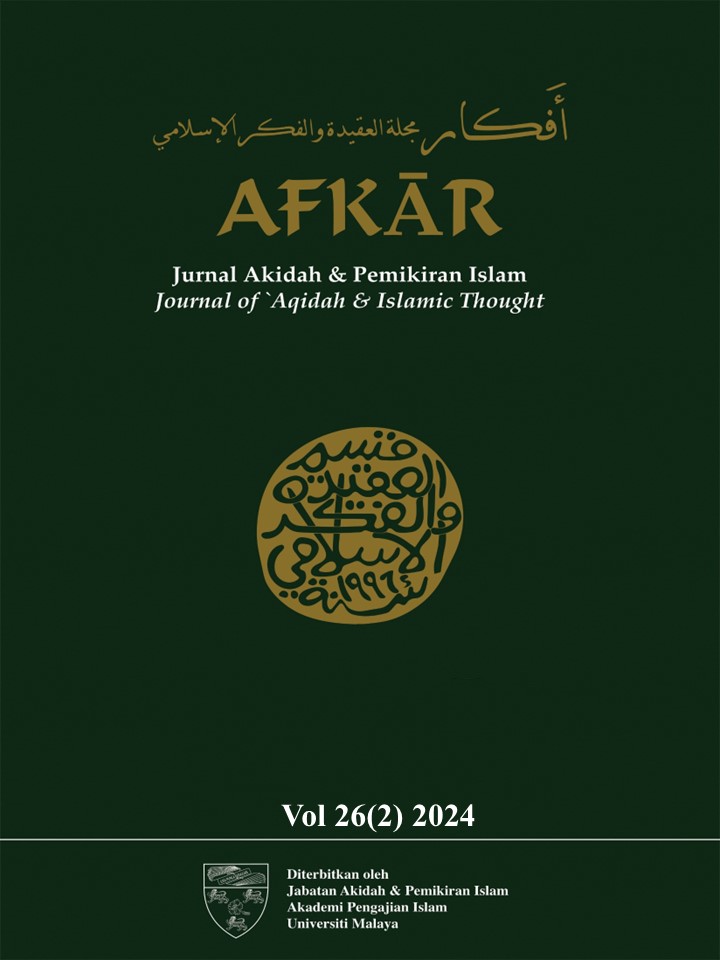Arab-Muslim Intellectual Responses to Modernity: Navigating Anxiety and Authenticity in the Thoughts of Muhammad Abid al-Jabiri and Abdurrahman Taha
Main Article Content
Abstract
This study aims to unfold the intellectual dynamics within modern Arab thought, particularly during the second phase of the Arab Renaissance, which seeks to overcome civilizational anxiety in dealing with modernity. Rather than outlining the broad spectrum of modern Arab intellectual discourses—ranging from Salafists and liberalists to Marxists—this research focuses on the “epistemological approach” introduced and championed by two modern Moroccan philosophers, Muhammad Abid al-Jabiri (referred to as al-Jabiri) and Abdurrahman Taha. By engaging with the intellectual works of al-Jabiri and Taha, this study demonstrates how their readings and approaches to tradition (turath) provide alternative ways of overcoming Arab-Muslim civilizational anxiety and discovering authentic forms of modernity. While al-Jabiri offers a contemporary reading of tradition that advocates the Rushdian spirit, Taha emphasizes the inter-relational, ethical, and practical aspects of tradition necessary for building a solid foundation of Arab-Muslim ethical modernity.
Downloads
Article Details

This work is licensed under a Creative Commons Attribution-NonCommercial 4.0 International License.
References
Abdessamad, Belhaj. "“The Fall of the Western Family” Taha Abdurrahman's Critical Islamic Ethics." ReOrient 4(1) (2018): 24-43.
Abdurrahman, Taha. Su’al al-Manhaj: Fi Ufuq al-Ta’sis li Unmudhaj Fikri Jadid, ed. Radwan Marhum. Beirut: al-Mu’assasah al-ʿArabiyyah li al-Fikr wa al-Ibdaʿ, 2015.
Abdurrahman, Taha. Tajdid al-Manhaj fi Taqwim al-Turath. Casablanca: al-Markaz al-Thaqafi al-ʿArabi, 2007.
Aksoy, Nuriye. "Meeting the Challenges of Modernity as Experienced by Said Nursi, Muhammad Iqbal and Muhammad Abduh." M.A. Diss., Rutgers The State University of New Jersey, 2015 (1603538).
Al-Jabiri, Mohammed Abed. Arab-Islamic Philosophy: Contemporary Critiques, trans. Aziz Abbasi. Texas: The Center for Middle Eastern Studies The University of Texas, 1999.
Al-Jabiri, Muhammad ʿAbid. Al-Khitab Al-ʿArabi al-Muʿasir. Beirut: Markaz Dirasat al-Wihdah al-Arabiyyah, 1992.
Al-Jabiri, Muhammad ʿAbid. Bunyat al-ʿAql al-ʿArabi: Dirasah Tahliliyah Naqdiyah li Nuzum al-Maʿrifah fi al-Thaqafah al-ʿArabiyyah. Beirut: Markaz Dirasat al-Wihdah al-Arabiyyah, 1990.
Ben Hammed, Mohamed Wajdi. "(Dis)Enchanting Modernity: Sufism and Its Temporality in the Thought of Mohammed Abed al-Jabri and Taha Abdurrahman." The Journal of North African Studies 26(3) (2021): 552–571. https://doi.org/https://doi.org/10.1080/13629387.2019.1697241.
Boullata, Issa J. Trends and Issues in Contemporary Arab Thoughts. New York: State University of New York Press, 1990.
Fawaid, Ahmad. "Kritik Atas Epistemologi Tafsir M. Abied a-Jabiri: Studi Kritis Atas Madkhal Ila Al Quran Al Karim." Ulul Albab 16(2) (2015): 157-175.
Hallaq, Wael B. Reforming Modernity: Ethics and the New Human in the Philosophy of Abdurrahman Taha. New York: Columbia University Press, 2019.
Harvey, Ramon. "Qurʾanic Values and Modernity in Contemporary Islamic Ethics Taha Abderrahmane and Fazlur Rahman in Conversation." In Islamic Ethics and the Trusteeship Paradigm: Taha Abderrahmane’s Philosophy in Comparative Perspectives, ed. Mohammed Hashas & Mutaz al-Khatib. Boston: Brill, 2020: 150-169
Hashas, Mohammed. "The Trusteeship Paradigm the Formation and Reception of a Philosophy." In Islamic Ethics and the Trusteeship Paradigm: Taha Abderrahmane’s Philosophy in Comparative Perspectives, ed. Mohammed Hashas and Mutaz al-Khatib. Boston: Brill, 2020: 37-61.
Hashas, Mohammed & Mutaz al-Khatib eds. Islamic Ethics and the Trusteeship Paradigm: Taha Abderrahmane’s Philosophy in Comparative Perspectives. Boston: Brill, 2020.
Hourani, Albert. Arabic Thought in the Liberal Age, 1798-1939. Cambridge: Cambridge University Press, 1983.
Irwin, Robert. Dangerous Knowledge: Orientalism and Its Discontents. New York City: Overlook Press, 2006.
Kamali, Mohammad Hashim. Principles of Islamic Jurisprudence. Cambridge: Islamic Texts Society, 1991.
Khilmi, Miftah. "Problematika Kajian Alquran di Era Modern: Studi Pemikiran ‘Abid al-Jabiri." Quran and Hadith Studies 7(1) (2018): 25-41.
Kigar, Samuel. "Arguing the Archive: Taha ʿAbd Al-Rahman, Muhammad ʿAbid Al-Jabiri, and the Future of Islamic Thought." Comparative Islamic Studies 11(1) (2015): 5–33. https://doi.org/https://doi.org/10.1558/cis.30824.
Martin, Kevin W.. "Presenting the “True Face of Syria” to the World: Urban Disorder and Civilizational Anxieties at the First Damascus International Exposition." International Journal of Middle East Studies 42 (2010): 391–411.
Massad, Joseph A.. Desiring Arabs. Chicago: The University of Chicago Press, 2007.
Muhamad Agus, Mushodiq. "Perilaku Patologis Pada Kisah Nabi Musa dan ‘Abd Dalam Al-Qur'an: Telaah Epistemologi Al-Jâbirî dan Semiotika Peirce." Ulul Albab 19(1) (2018): 69-97.
Rabi, Ibrahim M. Abu. Contemporary Arab Thought: Studies in Post-1967 Arab Intellectual History. Virginia: Pluto Press, 2004.
Ridwan, Ahmad Hasan. "Kritik Nalar Arab: Eksposisi Epistemologi Bayani, ‘Irfani, dan Burhani Muhammad Abed Al-Jabiri." Afkaruna: Indonesian Interdisciplinary Journal of Islamic Studies 12(2) (2016): 27-93. https://dx.doi.org/10.18196/afkaruna.v12i2.2793.
Said, Edward. Orientalism. New York: Vintage Book Edition, 1979.
Taylor, Peterson Adamson & Richard C.. The Cambridge Companion to Arabic Philosophy. Cambridge: Cambridge Press University, 2005.
Van Der Sluis, Willem. "Islam and Modernity. Perspectives of Jamal Ad-Din "Al-Afghani" (1838-1897)." Historisch Tijdschrift Groniek Midden-Oosten 217 (2017). https://doi.org/10.21827/groniek.217.35727.
Viersen, Harald. "The Modern Mysticism of Taha Abderrahmane." In Islamic Ethics and the Trusteeship Paradigm: Taha Abderrahmane’s Philosophy in Comparative Perspectives, eds. Mohammed Hashas & Mutaz al-Khatib. Boston: Brill, 2020: 170-94.
Yusuf, Aasia. "Islam and Modernity: Remembering the Contribution of Muhammad Abduh (1849-1905)." ICR Journal 3(2) (2012): 355-369.

